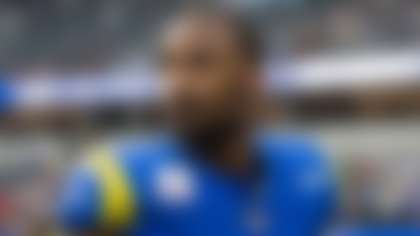With all the attention on the passing game, the decline of the running back position in the NFL has become a popular talking point. But recent events suggest running backs still hold plenty of value. The proof is in the bank account.
On Monday, the Baltimore Ravens' Ray Rice and Chicago Bears' Matt Forte joined a growing list of running backs who have gotten paid the past two seasons. Teams have committed more than $400 million to the game's elite ball carriers: Adrian Peterson, Chris Johnson, Marshawn Lynch, DeAngelo Williams, Fred Jackson, LeSean McCoy, Pierre Thomas, Arian Foster, Forte and Rice have all cashed in. Kansas City's Jamaal Charles is locked down for a while, too.
Cosell: What's a running back worth?
The value of RBs like Chris Johnson in today's NFL is a hotly debated topic. Greg Cosell of NFL Films shares his view. **More ...**
What's truly interesting to me, though, stems from a conversation I had last week with free-agent running back Ryan Grant. The ex-Green Bay Packer told me that if these guys don't live up to the money, the cash flow to running backs will dry up. Grant's not talking about himself. He knows he's had his moment. He's talking about running backs like Darren McFadden, Ryan Mathews, guys a few years down the line.
It's hard to think the big bucks will stop flowing after witnessing how teams paid their stud runners, but after examining 2011 production for some of the highest paid RBs, Grant could be on to something.
Johnson didn't have a CJ2K-like season (1,047 yards, 4 TDs) after signing a deal worth up to $55 million. Adrian Peterson, the best back in the game, didn't reach 1,000 yards (970 yards, 12 TDs) and blew out his knee late in the season, putting his availability at the start of 2012 into question. Charles wrecked his knee on his second carry in Week 2. Williams penned a $43 million deal with Carolina and rushed for 836 yards and seven touchdowns.
I've talked to enough GMs and personnel people who said that stunted production of backs they consider to be excellent is enough to make them think twice about committing big, long-term dollars to a running back.
Yet teams did it anyway. Heck, the Cleveland Browns traded up to the third spot in the 2012 NFL Draft to nab Alabama running back Trent Richardson. They might have to pay him huge money in a few years. But that path could be determined by the above group.
To Grant's point, if Peterson, Charles, Johnson and Williams don't regain traction and more of the recently signed runners don't produce the way they're expected to, teams could begin to follow through with more than threats of a franchise tag. They could churn and burn running backs, rarely signing any to second contracts. Instead, they could just let them test a market where other teams could be just as reluctant.
Play fantasy football on NFL.com
Your fantasy team plays in the NFL, so why don't you? Sign up to play the NFL's official free fantasy football game.
So far, that's been an empty threat. A glance at the running back horizon shows that most teams won't have to worry about things for a while, at least until the next Charles or Foster surfaces out of nowhere. Oakland's McFadden and San Diego's Mathews likely are the next guys due -- and they've got some things to prove before their teams (or any others) would bid big bucks for their services.
Then there's the Jacksonville Jaguars. Though Maurice Jones-Drew is under contract for two more seasons at $9.4 million total, he skipped all offseason workouts and seems inclined to hold out from training camp, even at the expense of $30,000 in fines per day. Jones-Drew is one of the NFL's best players and he's The Show for a Jacksonville team that said it won't re-do his deal.
It would be hard to think that Jones-Drew, after seeing all these players get paid (he shares an agent with Forte), will be comfortable playing for his current salary. People can begrudge him for not honoring his contract, but it would be hard to argue that he hasn't outplayed that deal and probably done it on a worse team than any of the other running backs who've been rewarded.
Jones-Drew is a valuable player who seems willing to dare Jacksonville to improve without him. We'll see who blinks first. We keep hearing that running backs are interchangeable parts, but the evidence seems to dictate otherwise.
Follow Steve Wyche on Twitter @wyche89



